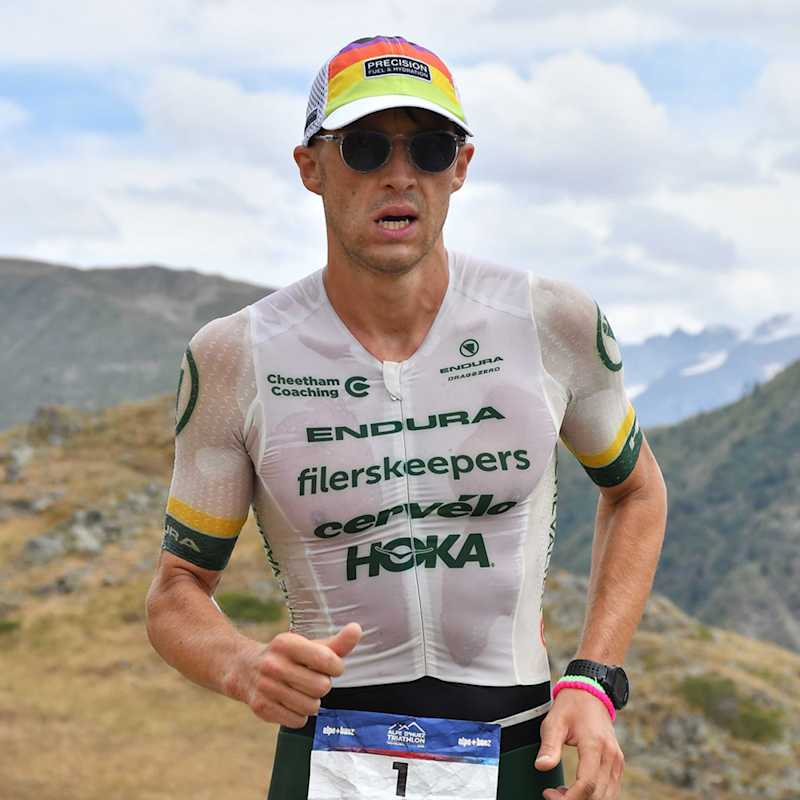
Leon's headline numbers
Leon's strategy
Fueling
Carbohydrate is the main fuel you burn when racing. Failing to fuel properly is a leading cause of underperformance in longer races.
Leon had a solid carb intake across the race, averaging just shy of the scientific recommendations for an event of this distance and intensity. He managed his intake well to consistently fuel across both the bike and run sections and avoided a drop off in energy levels, even in the latter stages. Leon’s main source of carbs came from energy drink mix, but he also consumed a few PF 30 Gels throughout to ensure a consistent flow of glucose was available in his bloodstream. Even after an unusual pre-race breakfast for him, which included eggs, ham and cheese, Leon didn’t suffer any GI issues during the race. He really does have a stomach of steel!
Hydration
Taking on board an appropriate amount of fluid and sodium is essential to maintaining blood volume and supporting the cardiovascular effort needed to perform on race day.
Whilst the absolute amount of sodium and fluid consumed per hour is important, it’s critical to consider these in relation to each other. This is known as 'relative sodium concentration' and it’s expressed in milligrams per litre (mg/L). How much sodium you’re taking in per litre of fluid is more important than the absolute amount taken in per hour.
Sweat sodium concentration (mg/L) is largely genetically determined and remains relatively stable. Knowing how salty your sweat is enables you to replace a good proportion of your sweat losses, which can range from 200-2,000mg/L.
Given Leon’s losses are High (1,392mg/L), nailing his hydration strategy becomes especially crucial when it’s hot and/or humid.
Learn moreLeon’s hydration strategy leaves little room for improvement. Given the warmer environmental conditions, his fluid intake could have been slightly higher to be more in line with his increased sweat losses in the heat. Leon reported that he did not pee during the race, which can be an indication of dehydration considering the length of the event. Despite this, he didn’t feel particularly thirsty and didn’t lose an excessive amount of bodyweight, being within the ‘normal’ 2-4% dehydration that is tolerable when racing. So, whilst he may have been treading the line, he still did an adequate job to balance his fluids and electrolytes. Leon relied on PH 1000 amongst other drink mixes to keep him hydrated across the bike leg and opted to supplement the water he picked up on the run with some Electrolyte Capsules. Moving forward, we would encourage Leon to adjust his intake in response to the warmer conditions, paired with a slightly higher sodium concentration to reduce the likelihood of dehydration-related symptoms.
Caffeine
Beyond the Three Levers of Performance (carb, sodium and fluid), caffeine is one of only a few substances that is proven to improve performance for most endurance athletes as it can help stave off mental and physical fatigue.
Leon was well within the general scientific recommendations after consuming caffeinated energy gels throughout the race, as well as a few sips of cola during the run. This level of caffeine intake would have allowed him to reap the ergogenic benefits of the stimulant and support his energy levels whilst working at a high-intensity.
How Leon hit his numbers
Here's everything that Leon ate and drank on the day...
Leon's weapons of choice
Final thoughts
Leon's full stats
Data Confidence?
There is good confidence in the accuracy of the data reported. An athlete feels that the numbers closely reflect what they consumed despite a couple of estimations which may carry some degree of error. The majority of what was consumed is recorded to a high level of specificity (most volumes are known through the use of bottles brands quantities flavours). The numbers are very plausible and align with previous data recordings (if an athlete has collected data previously).